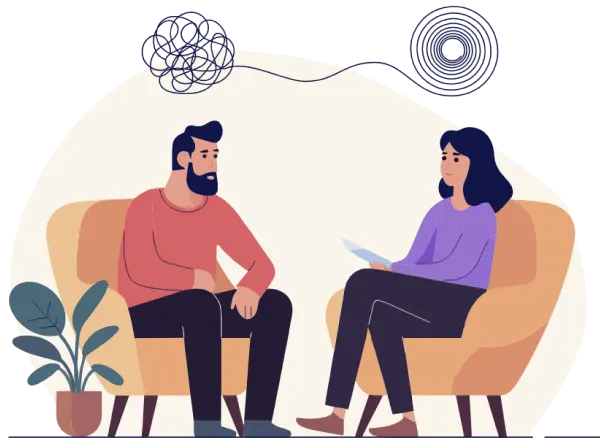Roughly 70% of adults face traumatic events, with 1 in 5 developing PTSD. These experiences can significantly impact mental and physical well-being. However, trauma and PTSD are highly treatable; 70-90% of people who receive trauma-informed care can recover. With specialized PTSD therapy services tailored to individual needs, you can find relief from symptoms. Contact our office today to schedule an appointment with our best trauma therapists in Chestnut
Find Relief Today

Occurs due to a single, intense traumatic event, such as natural disasters, sexual assault, medical emergencies, physical assault, or mass shootings. Many individuals experience acute trauma without enduring symptoms beyond six months.
Involves recurrent and prolonged traumatic circumstances, like homelessness, poverty, domestic or emotional abuse, or chronic illness, often persisting over an extended period.
Arises from prolonged exposure to traumatic events during childhood, potentially leading to chronic PTSD. Such experiences may include childhood abuse, neglect, recurring sexual or physical assault, enduring poverty or homelessness, or residing in war-torn regions.
Traumatic Stress Disorder is a mental health condition that can develop after a traumatic event. PTSD can last for anywhere from six months to several years. Factors contributing to PTSD susceptibility include prior traumas, a family history of PTSD, limited social support, high chronic stress levels, or lower socioeconomic status.
PTSD affects mental and physical health. Chestnut's therapy provides a holistic approach to recovery, addressing heightened nervous system alertness and its adverse physical effects, including:
Trauma can often feel like it hijacks your brain, and the loss of control can be frightening. Consult a Chestnut trauma therapist if you experience PTSD or trauma symptoms such as:
Yes; research has indicated that trauma-informed care and specialized PTSD therapy interventions are exceptionally successful in alleviating trauma and PTSD symptoms in around 6 months to 1 year. The PTSD therapists in Chestnut possess extensive expertise in trauma systems therapy, trauma-informed therapy, as well as various other forms of PTSD therapy, including:
Eye Movement Desensitization and Reprocessing Therapy (EMDR)
Trauma Systems Therapy
Cognitive Processing Therapy (CPT)
Narrative Exposure Therapy


As important as talk therapy is to the trauma recovery process, it’s also important to have the skills and tools to help yourself calm down if you are triggered. Being triggered by a trauma just means your body is thrown into a state of fight-or-flight. When this happens, it is helpful to have coping mechanisms already set up to keep you calm. Some coping mechanisms for trauma include:













Many more...





Easy to use website to find exactly the counselor I’m looking for. Plenty of available appointments and they take most insurance! Therapy and counseling are so important, and finding quality care easily has been such a relief!
Rebekah





I highly recommend Lifebulb. This resource helps connect people to professional counselors which is so helpful especially in days like these. Its so incredibly important to have a good counselor to talk with. A good counselor will connect with you and talk you through lifes problems and situations as they arise. A good counselor will also help you process and understand things from a healthy perspective. Its so helpful to have a professional insight and not just biased personal opinions like what family and friends sometimes offer. Its so important to process our thoughts in a healthy way, talking things out and putting all the peices together so we can have a clear picture, a goal and more targeted communication which helps all our relationships. Wishing all reading this review you find someone you can connect with and learn from and grow into your best you.
Wendy





It's so good to have someone to objectively listen and help us solve our problems. Thank you
Lora





The group at Lifebulb truly care about helping people. The passion behind what they do is evident in the way they care for others and Im so thankful for their presence in our community! If your looking for quality counseling from professionals who care, your in the right place
Laura





A really nice place - beautiful and comfortable and it’s great to have the option of online or in person!
Leah





Have had such a wonderful experience working with everyone at Lifebulb. I was nervous about finding the right counselor but they made the process feel simple and safe. I was matched with an amazing counselor who provides the exact mentorship and life coaching I need.
Diana





I recommend Lifebulb Counseling & Therepy to anyone and everyone. This is a great place to get help and improve your life!
Ashley


Therapists | Insurance Coverage | Services Offered | Privacy
Mental health is just as important as physical health, and seeking professional help can sometimes be necessary to tackle life's challenges. Lifebulb Therapy & Counseling in Chestnut, PA offers a wide range of mental health services to help individuals overcome their struggles. Our services include but not limited to:
If you are searching for a supportive and empathetic counseling team, look no further than Lifebulb Counseling.
There are several options to book an appointment for counseling in Chestnut. You can call our office and talk to a team member who will find a licensed therapist for you. We’ll look over your insurance information and go over a few simple policies before emailing you a confirmation of your session date and time. Or, you can review our list of expert therapists in Chestnut, find one that you think would be best for you, and then you can select a session time all from our website. We will reach out shortly to confirm your appointment details.
Taking the step to reach out to a therapist takes courage, and it can be disheartening to take that leap and then spend weeks or months on a waitlist. We believe in connecting you with a therapist quickly, so we’ve made the process as easy as possible. If you know what you’re looking for, you can browse our Chestnut therapists’ bios to find the right fit for you and schedule a session through our website. Or, you can call our office and a team member will make sure you’re matched with the right therapist for you and your goals. Choosing the right therapist is important—they’ll be the ones to come up with an individualized treatment plan and help you reach your mental healthcare goals.
For all mental health emergencies, please call 911.
Lifebulb is not a crisis center and our therapists and counselors do not provide emergency services. However, we understand that urgent, non emergency matters happen. All clients are given direct email and phone access to their Chestnut therapist, who will do their best to respond as quickly as possible. If your treatment plan requires more frequent interactions, your therapist can provide you with outside resources.
We have a flexible cancellation policy. Call our office or reach out to your therapist at least 24 hours before your therapy session time to cancel or reschedule any appointment at no cost.
Maintaining your privacy is a serious matter. Lifebulb is considered a covered entity under HIPAA guidelines, which means we are subject to all HIPAA rules and regulations. If you have any questions (or recommendations) about our privacy and security practices, we want to help. Contact us at privacy@lifebulb.com.
No, Lifebulb never records online therapy sessions and always uses a private line.
Yes! Lifebulb believes in affordable therapy. We accept most major commercial insurance plans and offer an affordable self-pay rate. For more information, call our team.